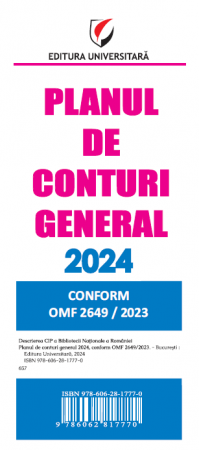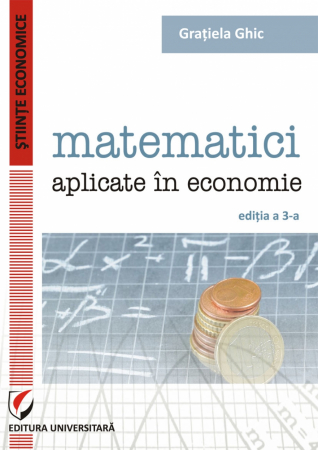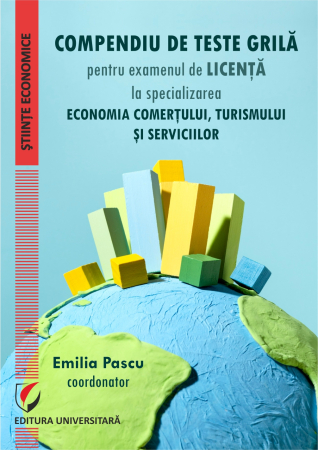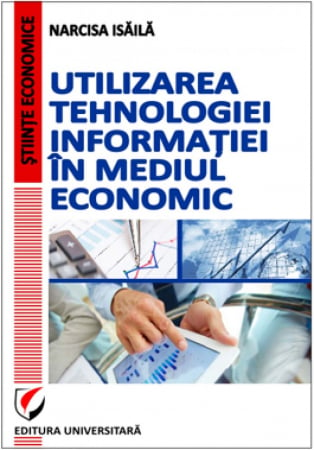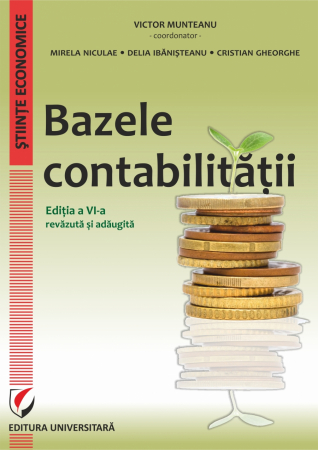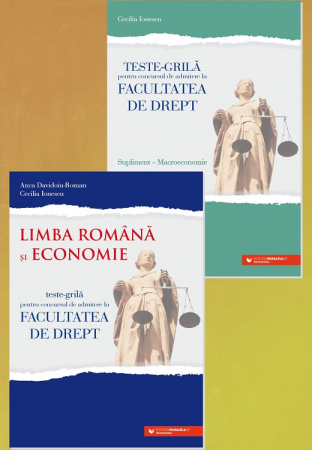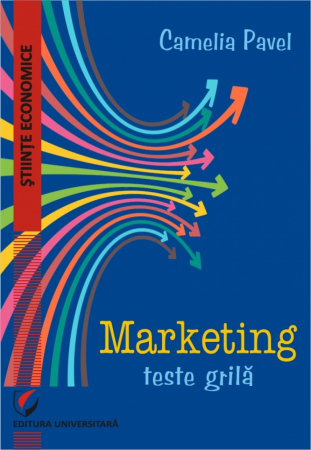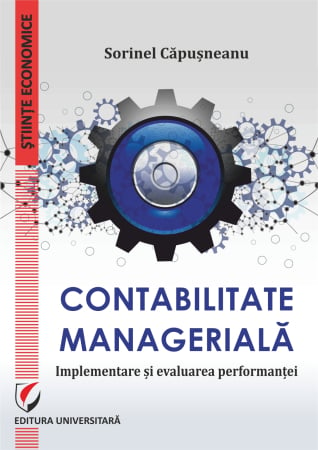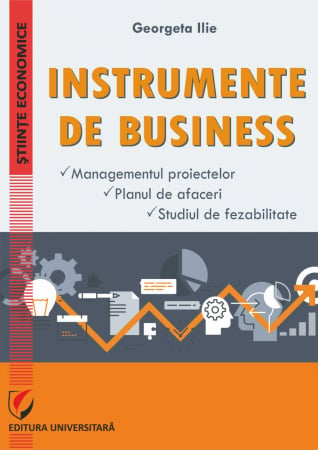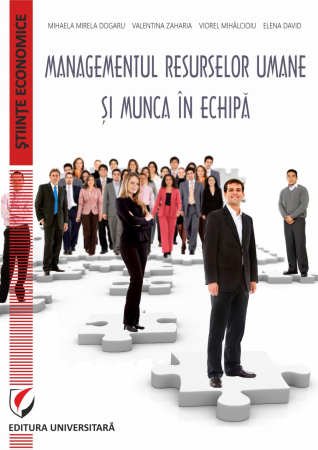Manuscript proposals: [email protected] / 0745 204 115 //// Tracking orders Individuals / Sales: 0745 200 357 / Orders Legal entities: 0721 722 783
Publisher: Editura Universitară
Author: Florina Popa
ISBN: 978-606-28-0774-0
DOI: 10.5682/9786062807740
Publisher year: 2018
Edition: I
Pages: 144
Product Code:
9786062807740
Do you need help?
0745 200 357
- Description
- Download (1)
- Authors
- Content
- More details
- Reviews (0)
The present evolution of human society, the continuation of the historical stages, with slower or more rhythmic movements, is surprised by challenges regarding the orientation towards new economic, social formulas, in which human knowledge is called to bring its contribution in the construction of a new society. a new, more efficient economic system.
The modern era is distinguished by a more demanding demand for resources, by their degradation and thinning, generated by the growth and economic development, worldwide, by the increase of the population. The predictions of some studies show the possibility of population growth, globally, from 6.9 billion inhabitants, currently, to 9 billion, over a few decades, considered as one of the biggest challenges of the 21st century. Adding to the above the need (continuously growing), energy, of post-industrialized or industrializing countries, in addition, the imbalances already experienced in the ecosystem (climate change, soil degradation, irrational exploitation), outlines the impact that growth needs (unlimited) has on resources (limited) and, respectively, on the evolution of human society, which reveals the importance of studying this phenomenon.
The current issue regarding the relations between the central and the local government, respectively between the institutions of public administration and those of the local administration, of the decision-makers in the field of development policies, has been a subject of debate, in which actors from the political, scientific environment are involved. -academic, universities, civil society.
These debates, through the chosen solutions, must lead to finding out the ways, the possibilities to identify and use the development resources as efficiently as possible, the capacity to make them as productive as possible.
In this context, the choice of this topic for the doctoral thesis "Centralization versus local autonomy in the management of development resources", aimed to study and understand how to allocate and use development resources, capturing some of the characteristics and elements more favorable or weaker , in the development of the processes, as they are developed in the chapters of the paper.
The modern era is distinguished by a more demanding demand for resources, by their degradation and thinning, generated by the growth and economic development, worldwide, by the increase of the population. The predictions of some studies show the possibility of population growth, globally, from 6.9 billion inhabitants, currently, to 9 billion, over a few decades, considered as one of the biggest challenges of the 21st century. Adding to the above the need (continuously growing), energy, of post-industrialized or industrializing countries, in addition, the imbalances already experienced in the ecosystem (climate change, soil degradation, irrational exploitation), outlines the impact that growth needs (unlimited) has on resources (limited) and, respectively, on the evolution of human society, which reveals the importance of studying this phenomenon.
The current issue regarding the relations between the central and the local government, respectively between the institutions of public administration and those of the local administration, of the decision-makers in the field of development policies, has been a subject of debate, in which actors from the political, scientific environment are involved. -academic, universities, civil society.
These debates, through the chosen solutions, must lead to finding out the ways, the possibilities to identify and use the development resources as efficiently as possible, the capacity to make them as productive as possible.
In this context, the choice of this topic for the doctoral thesis "Centralization versus local autonomy in the management of development resources", aimed to study and understand how to allocate and use development resources, capturing some of the characteristics and elements more favorable or weaker , in the development of the processes, as they are developed in the chapters of the paper.
-
CENTRALIZARE VERSUS AUTONOMIE LOCALA IN GESTIONAREA RESURSELOR DE DEZVOLTARE
Download
FLORINA POPA
Short presentation of the motivation for choosing the study topic / 9
I. The role and importance of development resources in the economy / 11
Short presentation chapter I / 11
1.1. Theoretical approaches to growth and development / 12
1.2. Development resources. Conceptual elements, definitions / 14
1.3. Conclusions / 30
II. Resource allocation / 32
Short presentation chapter II / 32
2.1. Natural economy, exchange economy / 33
2.2. Allocation of resources within the exchange economy models / 36
2.3. Conclusions / 45
2.4. Case study / 46
□ Analysis of public administration expenditures in European Union countries in 2015/47
□ Dynamics of the evolution of public administration expenditures / 54
2.5. Conclusions / 57
III. Aspects regarding centralization and decentralization / 58
Short presentation chapter III / 58
3.1. The state, actor in economic life / 59
3.2. The relations between the central administration authorities and the local administration authorities. Forms of transfer of authority / 61
3.2.1. Centralization / 62
3.2.2. Decentralization / 63
3.3. Local autonomy, concept, particularities / 71
3.4. Peculiarities of decentralization / 75
3.5. Conclusions / 77
IV. Region - important location for the use of development resources / 79
Short presentation chapter IV / 79
4.1. Region, characteristic elements / 80
4.2. Regionalism, regionalization / 81
4.3. Regionalization, element of decentralization / 84
4.4. Case Study. The forms of regionalization that are found in Europe through the prism of regional autonomy / 86
4.5. Conclusions / 91
V. Forms of structuring the activity at the level of an organization / 93
Short presentation chapter V / 93
5.1. Centralization / 93
5.2. Decentralization / 94
5.3. Conclusions / 100
VI. Some approaches to the use of development resources / 101
Short presentation chapter VI / 101
6.1. Aspects regarding the New Public Management compared to the traditional public administration / 102
6.2. Conclusions / 108
6.3. The role of smart specialization as a strategy for the use of development resources / 110
6.4. Clusters, an element of economic growth, competitive advantage / 116
6.5. Conclusions / 118
VII. Proposals / 120
BIBLIOGRAPHY / 123
I. The role and importance of development resources in the economy / 11
Short presentation chapter I / 11
1.1. Theoretical approaches to growth and development / 12
1.2. Development resources. Conceptual elements, definitions / 14
1.3. Conclusions / 30
II. Resource allocation / 32
Short presentation chapter II / 32
2.1. Natural economy, exchange economy / 33
2.2. Allocation of resources within the exchange economy models / 36
2.3. Conclusions / 45
2.4. Case study / 46
□ Analysis of public administration expenditures in European Union countries in 2015/47
□ Dynamics of the evolution of public administration expenditures / 54
2.5. Conclusions / 57
III. Aspects regarding centralization and decentralization / 58
Short presentation chapter III / 58
3.1. The state, actor in economic life / 59
3.2. The relations between the central administration authorities and the local administration authorities. Forms of transfer of authority / 61
3.2.1. Centralization / 62
3.2.2. Decentralization / 63
3.3. Local autonomy, concept, particularities / 71
3.4. Peculiarities of decentralization / 75
3.5. Conclusions / 77
IV. Region - important location for the use of development resources / 79
Short presentation chapter IV / 79
4.1. Region, characteristic elements / 80
4.2. Regionalism, regionalization / 81
4.3. Regionalization, element of decentralization / 84
4.4. Case Study. The forms of regionalization that are found in Europe through the prism of regional autonomy / 86
4.5. Conclusions / 91
V. Forms of structuring the activity at the level of an organization / 93
Short presentation chapter V / 93
5.1. Centralization / 93
5.2. Decentralization / 94
5.3. Conclusions / 100
VI. Some approaches to the use of development resources / 101
Short presentation chapter VI / 101
6.1. Aspects regarding the New Public Management compared to the traditional public administration / 102
6.2. Conclusions / 108
6.3. The role of smart specialization as a strategy for the use of development resources / 110
6.4. Clusters, an element of economic growth, competitive advantage / 116
6.5. Conclusions / 118
VII. Proposals / 120
BIBLIOGRAPHY / 123
The present evolution of human society, the continuation of the historical stages, with slower or more rhythmic movements, is surprised by challenges regarding the orientation towards new economic, social formulas, in which human knowledge is called to bring its contribution in the construction of a new society. a new, more efficient economic system.
The modern era is distinguished by a more demanding demand for resources, by their degradation and thinning, generated by the growth and economic development, worldwide, by the increase of the population. The predictions of some studies show the possibility of population growth, globally, from 6.9 billion inhabitants, currently, to 9 billion, over a few decades, considered as one of the biggest challenges of the 21st century. Adding to the above the need (continuously growing), energy, of post-industrialized or industrializing countries, in addition, the imbalances already experienced in the ecosystem (climate change, soil degradation, irrational exploitation), outlines the impact that growth needs (unlimited) has on resources (limited) and, respectively, on the evolution of human society, which reveals the importance of studying this phenomenon.
The current issue regarding the relations between the central and the local government, respectively between the institutions of public administration and those of the local administration, of the decision-makers in the field of development policies, has been a subject of debate, in which actors from the political, scientific environment are involved. -academic, universities, civil society.
These debates, through the chosen solutions, must lead to finding out the ways, the possibilities to identify and use the development resources as efficiently as possible, the capacity to make them as productive as possible.
In this context, the choice of this topic for the doctoral thesis "Centralization versus local autonomy in the management of development resources", aimed to study and understand how to allocate and use development resources, capturing some of the characteristics and elements more favorable or weaker , in the development of the processes, as they are developed in the chapters of the paper.
In essence, the author mentions some issues, which can be considered as elements of remark, in the study:
• emphasizing the importance of the phenomenon of economic growth and development, as a determining factor for the functioning and dynamics of an economy, the supporting element being the existence and use of development resources;
• the variety of types of resources was highlighted and presented in the form of their classification by categories of resources and criteria, represented in a detailed scheme;
• in the presentation of the allocation of development resources, the circuit of resources in the process of obtaining goods was followed, gradually, corresponding to the forms of manifestation of human activity and the evolution of society. the relationship between the decision-making methods, centralized - decentralized and the two theoretical models of the exchange economy (conductor, market economy) was highlighted;
• elaboration of a case study regarding the analysis of the public administration expenses in the European Union countries, in 2015 and the evolution, in dynamics, in the period 2007-2015;
• highlighting the forms of transfer, gradually, of the decision-making authority, from the most diluted form of decentralization, to its last stage, local autonomy and, correspondingly, the allocation of resources on each stage;
• a parallel between the administrative regimes based on the two principles of manifestation of authority (centralization-decentralization), particularities, influence in the use of resources;
• in the case of the forms of structuring the activity of an organization were identified and presented, comparatively, within the two forms of structuring the decision-making authority in an organization, the advantages and disadvantages of each, the distinctions between the two forms, and the consequences regarding the exercise modalities, of each formula on the results of the company's activity;
• emphasizing the importance of the region in the use of resources;
• presentation of a case study regarding the regionalization models practiced in the EU, in terms of the autonomy of the regions;
• a comparison between the forms of traditional public administration and the new public management, with the emphasis on the relationship between responsibility and efficiency, which marks the distinction between the two models;
• highlighting other mechanisms that lead to increasing competitiveness, oriented towards a sustainable economic growth of states / regions, through an efficient use of resources: smart specialization as a strategy for using resources, clusters, element of economic growth.
The modern era is distinguished by a more demanding demand for resources, by their degradation and thinning, generated by the growth and economic development, worldwide, by the increase of the population. The predictions of some studies show the possibility of population growth, globally, from 6.9 billion inhabitants, currently, to 9 billion, over a few decades, considered as one of the biggest challenges of the 21st century. Adding to the above the need (continuously growing), energy, of post-industrialized or industrializing countries, in addition, the imbalances already experienced in the ecosystem (climate change, soil degradation, irrational exploitation), outlines the impact that growth needs (unlimited) has on resources (limited) and, respectively, on the evolution of human society, which reveals the importance of studying this phenomenon.
The current issue regarding the relations between the central and the local government, respectively between the institutions of public administration and those of the local administration, of the decision-makers in the field of development policies, has been a subject of debate, in which actors from the political, scientific environment are involved. -academic, universities, civil society.
These debates, through the chosen solutions, must lead to finding out the ways, the possibilities to identify and use the development resources as efficiently as possible, the capacity to make them as productive as possible.
In this context, the choice of this topic for the doctoral thesis "Centralization versus local autonomy in the management of development resources", aimed to study and understand how to allocate and use development resources, capturing some of the characteristics and elements more favorable or weaker , in the development of the processes, as they are developed in the chapters of the paper.
In essence, the author mentions some issues, which can be considered as elements of remark, in the study:
• emphasizing the importance of the phenomenon of economic growth and development, as a determining factor for the functioning and dynamics of an economy, the supporting element being the existence and use of development resources;
• the variety of types of resources was highlighted and presented in the form of their classification by categories of resources and criteria, represented in a detailed scheme;
• in the presentation of the allocation of development resources, the circuit of resources in the process of obtaining goods was followed, gradually, corresponding to the forms of manifestation of human activity and the evolution of society. the relationship between the decision-making methods, centralized - decentralized and the two theoretical models of the exchange economy (conductor, market economy) was highlighted;
• elaboration of a case study regarding the analysis of the public administration expenses in the European Union countries, in 2015 and the evolution, in dynamics, in the period 2007-2015;
• highlighting the forms of transfer, gradually, of the decision-making authority, from the most diluted form of decentralization, to its last stage, local autonomy and, correspondingly, the allocation of resources on each stage;
• a parallel between the administrative regimes based on the two principles of manifestation of authority (centralization-decentralization), particularities, influence in the use of resources;
• in the case of the forms of structuring the activity of an organization were identified and presented, comparatively, within the two forms of structuring the decision-making authority in an organization, the advantages and disadvantages of each, the distinctions between the two forms, and the consequences regarding the exercise modalities, of each formula on the results of the company's activity;
• emphasizing the importance of the region in the use of resources;
• presentation of a case study regarding the regionalization models practiced in the EU, in terms of the autonomy of the regions;
• a comparison between the forms of traditional public administration and the new public management, with the emphasis on the relationship between responsibility and efficiency, which marks the distinction between the two models;
• highlighting other mechanisms that lead to increasing competitiveness, oriented towards a sustainable economic growth of states / regions, through an efficient use of resources: smart specialization as a strategy for using resources, clusters, element of economic growth.
If you want to express your opinion about this product you can add a review.
write a review

6359.png)
![Centralization versus local autonomy in the management of development resources - Florina Popa [1] Centralization versus local autonomy in the management of development resources - Florina Popa [1]](https://gomagcdn.ro/domains/editurauniversitara.ro/files/product/large/centralizare-versus-autonomie-locala-in-gestionarea-resurselor-de-dezvoltare-265-482608.jpg)
